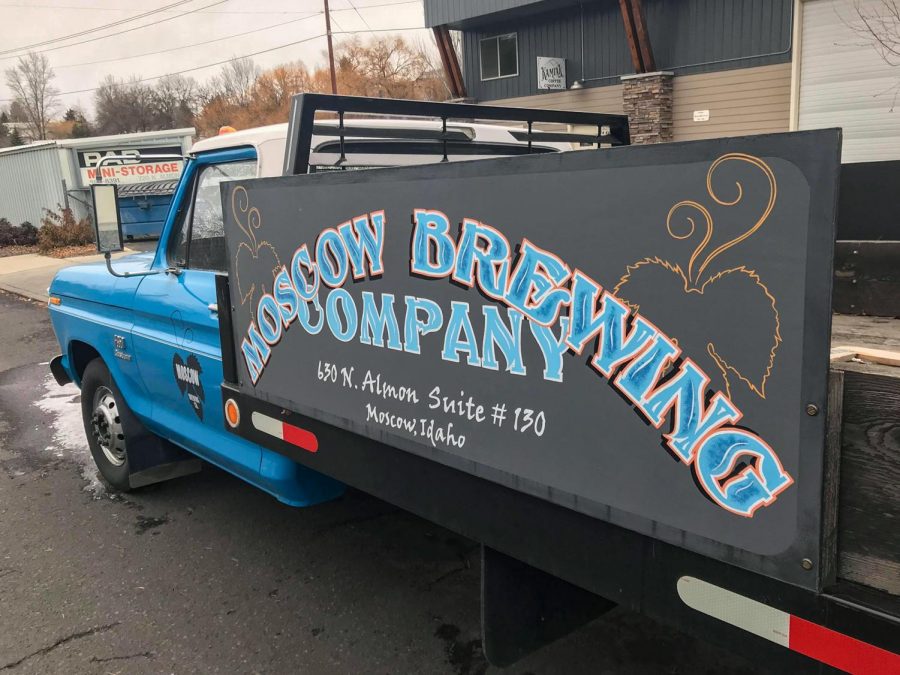Brewery brings art of beer back
There are five small breweries within 10 miles of Moscow
CAMERON SHEPPARD | THE DAILY EVERGREEN
A blue pickup truck with the Moscow Brewing Company name painted on the side sits parked in front of the business on Dec. 1. Aaron Hart, owner and head brewer, said they use the truck to deliver kegs to local businesses.
December 6, 2019
The Pacific Northwest has played a large role in the growth of the brewing industry as the region has welcomed craft brewing with open arms. The Seattle metropolitan area has more breweries than most, if not all, other cities in the U.S. with more than 170, many of which have been opened in the last 15 years.
Smaller rural communities like Moscow have seen a recent influx in craft breweries too. There are now about five small breweries within less than 10 miles of the town.
Aaron Hart, owner and head brewer at the Moscow Brewing Company, said when he graduated from the University of Idaho in 2010, there were basically no breweries in town and only a few taprooms that served regionally crafted beers.
Hart and two business partners decided to buy the Moscow Brewing Company from the previous owner in 2017 after it closed a year earlier. They thought they could tap into an unestablished market: people who were looking to enjoy good local beer.
“We were basically buying a failed business from the previous owner,” he said. “There was a lot of risk involved with buying that.”
Hart said he was a self-taught brewer learning mostly from experimentation at home. He read brewing articles and books, anything he could to learn about making beer. A lot of the early brewing was just trial and error.
“I definitely had my share of beers that were not up to my standard,” Hart said.
By 2013, Hart and his partners had started homing in on a core set of recipes they had developed. They held parties and let their friends taste these brews.
“Everyone said good things,” he said.
The recipes for the company’s Flagship IPA and Kölcsh Ale have changed a little, but Hart said they are mostly based on the original recipes they worked on years ago.
Hart and his partners kept their day jobs for the first year-and-a-half after they reopened the brewery. Hart said it was difficult to get the word out about their reopening.
Hart said the brewery has since become more established. Earlier this year he bought out his two business partners to become the sole owner.
“I decided I was going to go two feet in,” he said.
Production at the Moscow Brewing Company has nearly tripled in output capacity, but the operation remains small-scale. Hart does most of the brewing as well as the handling and distribution.
Parked in front of the brewery was a bright blue pickup truck painted with the company name. Hart said the truck is used to deliver kegs of beer to local businesses.
Hart said he does not have the space or need for an automated canning machine, but he does have a machine that he can use to manually can larger 32-ounce containers.
He said it can sometimes be difficult to compete with large distributors who send representatives to venues two to three times a week to try and sell beers from larger companies. Hart said he just does not have the time to spend competing for sales with large vendors like that all the time.
With the growing mainstream appeal of craft beer, Hart said companies around the region that were once small-scale microbreweries are being bought out by larger companies and their production is being scaled up. He said craft brewing could be done poorly if large companies only focus on their bottom line.
“Brewing is an art and a science,” he said. “I think you lose a bit of the art when you go to make these massive batches.”
Hart said while the Moscow Brewing Company is still a business that will have to worry about its bottom line, what drives him is his passion for the craft of brewing.
He said his friends often ask him what he would do if a big company like Anheuser-Busch offered him a million-dollar buyout.
“Assuming I don’t have to sign a no-compete clause, I would take the money, buy better equipment and start a new brewery,” he said. “This place fills a certain need for Moscow, and I hope to be a part of that for a long time.”








